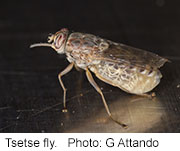
THURSDAY, April 24, 2014 (HealthDay News) — Scientists who mapped the genome of the tsetse fly say this genetic information could lead to new ways to fight African sleeping sickness.
The tsetse fly is the only insect that transmits the disease, which threatens the health and lives of millions of people and decimates livestock herds in many parts of Africa.
The international team of 140 researchers spent nearly 10 years sequencing the tsetse fly’s genetic code, which contains 366 million letters of code. That’s about 10 percent of the amount in the human genome.
This breakthrough is expected to speed up research into the fly’s biology, and could lead to the development of new ways to control the pest, according to the authors of the study in the current issue of the journal Science.
“This is a major milestone for the tsetse research community,” study author Geoffrey Attardo, a research scientist at the Yale School of Public Health, said in a Yale news release.
There are drugs to treat sleeping sickness. However, they are costly, cause many side effects and are difficult to use in many parts of rural Africa where the disease is most common, the study authors noted in the news release. If untreated, sleeping sickness always causes death.
More information
The U.S. Centers for Disease Control and Prevention has more about sleeping sickness.
Copyright © 2026 HealthDay. All rights reserved.

